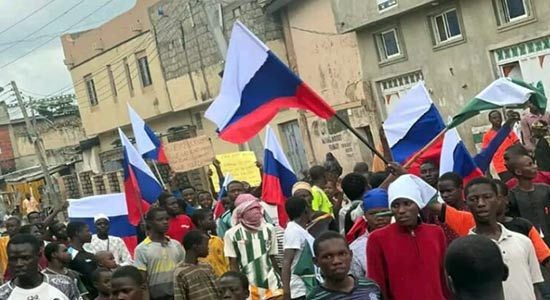On August 6, 2024, the Nigerian government took decisive action against the growing wave of protests across the country. These protests, initially driven by economic hardship, took a controversial turn when demonstrators began waving Russian flags, prompting a strong response from security forces and the government.
Arrests and Crackdown
Operatives of the Nigeria Police Force arrested over 900 #Endbadgovernance protesters, including 30 individuals specifically for waving Russian flags in Kano, Kaduna, Katsina, and Bauchi states. Muyiwa Adejobi, the Force spokesperson, highlighted the arrest of a tailor named Ahmed Bello in Kano, who was found with a large number of these flags.
This development came after President Bola Tinubu directed security agencies to clamp down on anyone flying foreign flags within Nigeria. The President’s directive was reaffirmed by Gen. Christopher Musa, Chief of Defence Staff, during a briefing following the National Security Council meeting attended by all service chiefs, including Vice President Kashim Shetima and National Security Adviser Nuhu Ribadu.
Escalating Violence
While the protests began peacefully, they escalated into violence, leading to looting and destruction of property in several states. General Musa explained the government’s stance: “We will not accept anybody, any individual flying any foreign flag in Nigeria. That is a treasonable offence, and it will be viewed and treated as such.”
Protesters in various regions, including the busy Kano-Zaria Road and near the Nyanya bridge in Abuja, were seen waving Russian flags and chanting slogans against the government in Hausa. This display of foreign allegiance prompted the government to implement curfews and hold emergency security meetings in affected states.
Government and Security Response
The response from the Nigerian government has been multi-faceted. In Bauchi, Governor Bala Mohammed chaired an emergency Security Council meeting to address infrastructure destruction, while Kaduna Governor Uba Sani announced a 24-hour curfew in Kaduna and Zaria metropolitan areas to curb the unrest.
The Department of State Services (DSS) also played a critical role, arresting tailors responsible for making the Russian flags and some of their sponsors. In Plateau State, Governor Caleb Mutfwang imposed a 24-hour curfew in Jos and Bukuru metropolis following incidents of looting and vandalism.
Economic Hardship and Public Sentiment
The root of the protests lies in the economic difficulties faced by Nigerians, exacerbated by the removal of fuel subsidies. In response, some governors, like Gombe State’s Muhammadu Yahaya, have announced plans to distribute food palliatives to alleviate the hardship. Yahaya stated, “We are deeply concerned about the welfare of our citizens and are committed to addressing these issues promptly.”
Police spokesperson Muyiwa Adejobi clarified that waving foreign flags is considered a treasonable felony, and those arrested for such actions would face severe consequences. He also addressed demands from protesters for the release of those jailed during the EndSARS protests, stating that those individuals were charged with serious criminal offenses unrelated to the protests.
International and Political Reactions
The Russian Embassy in Nigeria swiftly denied any involvement in the protests, emphasizing Russia’s policy of non-interference in the internal affairs of other countries. Meanwhile, the New Nigeria People’s Party distanced itself from the protesters, attributing the actions to nationals from neighboring countries.
In response to President Tinubu’s nationwide broadcast urging protesters not to be used by “enemies of democracy,” organizers of the #Endbadgovernance protest have vowed to petition the United Nations over alleged rights abuses. The arrest of protest leader Michael Lenin by the DSS has further intensified the situation, with activists calling for his immediate release.
Conclusion
The ongoing protests in Nigeria, marked by economic grievances and controversial displays of foreign allegiance, have prompted a strong governmental response aimed at preserving national sovereignty and public order. As the situation evolves, the government’s commitment to addressing economic challenges while maintaining security remains at the forefront. The protests highlight the delicate balance between citizens’ rights to express discontent and the state’s duty to uphold law and order.



























































